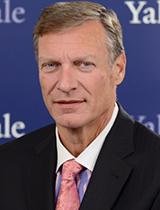Famous Ted Malloch Quotes
Source: Doing Virtuous Business (Thomas Nelson, 2011), p. 66.
Source: Doing Virtuous Business (Thomas Nelson, 2011), p. 65.
Source: Doing Virtuous Business (Thomas Nelson, 2011), p. 78.
“The laws of economic life are subject to the eternal laws of spiritual capital.”
Source: Doing Virtuous Business (Thomas Nelson, 2011), p. 36.
Ted Malloch Quotes about business
Source: Doing Virtuous Business (Thomas Nelson, 2011), p. 78.
“The business virtue par excellence is honesty—without it markets can’t long survive.”
Source: Doing Virtuous Business (Thomas Nelson, 2011), p. 27.
“One runs a business ultimately to do well so you can do good for everyone.”
Source: Doing Virtuous Business (Thomas Nelson, 2011), p. 102.
“Three cardinal virtues of business: creativity, building community, practical realism.”
Source: Doing Virtuous Business (Thomas Nelson, 2011), p. 36.
“Profitability is the consequence of doing business in the right way, to honor God.”
Source: Doing Virtuous Business (Thomas Nelson, 2011), p. 52.
“Business is the real test of the moral life.”
Source: Doing Virtuous Business (Thomas Nelson, 2011), p. 17.
Ted Malloch Quotes
Source: Doing Virtuous Business (Thomas Nelson, 2011), p. 108.
“Attempts to secure an equal outcome always require unequal treatment of individuals.”
Source: Doing Virtuous Business (Thomas Nelson, 2011), p. 31.
“Faith engenders courage; and also requires it.”
Source: Doing Virtuous Business (Thomas Nelson, 2011), p. 67.
“Discipline is the virtue that begins in obedience and flowers in self-control.”
Source: Doing Virtuous Business (Thomas Nelson, 2011), p. 32.
“Capitalism is about the mutual creation of wealth rather than the pillaging of it.”
Source: Doing Virtuous Business (Thomas Nelson, 2011), p. 29.
Doing Virtuous Business (Thomas Nelson, 2011)
“Taking faith seriously leads to the utility of altruistic behavior.”
Source: Doing Virtuous Business (Thomas Nelson, 2011), p. 102.
“There’s such a thing as spiritual capital that has economic function and potential.”
Source: Doing Virtuous Business (Thomas Nelson, 2011), p. 15.
“Profit doesn’t appear as the goal but as a side effect of pursuing motivating principles.”
Source: Doing Virtuous Business (Thomas Nelson, 2011), p. 3.
Source: Doing Virtuous Business (Thomas Nelson, 2011), p. 134.
“Caring for God’s endowment in a thrifty fashion is a form of biblical obedience.”
Source: Doing Virtuous Business (Thomas Nelson, 2011), p. 34.
“The free economy is not the enemy but the friend of social capital.”
Source: Doing Virtuous Business (Thomas Nelson, 2011), p. 9.
“When all benefits are promised by the state, nobody need feel grateful for them.”
Source: Doing Virtuous Business (Thomas Nelson, 2011), p. 28.
“Spiritual entrepreneurship is the unsung route to growth in the modern economy.”
Source: Doing Virtuous Business (Thomas Nelson, 2011), p. 37.
“We prepare for success by acquiring virtues.”
Source: Doing Virtuous Business (Thomas Nelson, 2011), p. 20.
“The moral sentiments that constrain economic life also promote it.”
Source: Doing Virtuous Business (Thomas Nelson, 2011), p. 13.
“Leadership, in other words, is a matter of character, not goals.”
Source: Doing Virtuous Business (Thomas Nelson, 2011), p. 62.
“Long-term success depends upon trust.”
Source: Doing Virtuous Business (Thomas Nelson, 2011), p. 10.
“When people freely identify with their work and find themselves through it, excellence follows.”
Source: Doing Virtuous Business (Thomas Nelson, 2011), p. 52.
“And the first question for a leader is: "Who do we intend to be?" not “What are we going to do?””
Source: Doing Virtuous Business (Thomas Nelson, 2011), p. 61.
“Myth: There’s conflict between selfish free markets and a benevolent world of human sympathy.”
Source: Doing Virtuous Business (Thomas Nelson, 2011), p. 10.
“An exercise of moral imagination helps companies further goals of its members.”
Source: Doing Virtuous Business (Thomas Nelson, 2011), p. 4.
Source: Europa, Eurabia and the Last man
